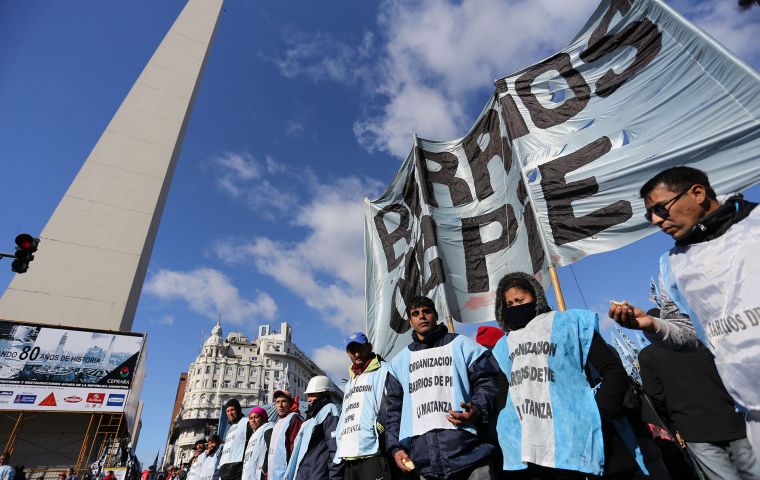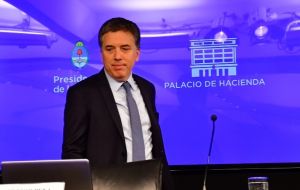MercoPress. South Atlantic News Agency
Argentine labor unions and social groups protest austerity measures in Buenos Aires City
 This year Argentina will close with inflation at more than 40%, according to economists' forecasts
This year Argentina will close with inflation at more than 40%, according to economists' forecasts  Economy Minister Nicolas Dujovne said earlier this month that it was weakness on the country's “fiscal flank” that prompted a run on the peso in August
Economy Minister Nicolas Dujovne said earlier this month that it was weakness on the country's “fiscal flank” that prompted a run on the peso in August Labor unions and social groups blocked streets in downtown Buenos Aires on Wednesday, with more marches planned over the days ahead over austerity measures proposed by the government and backed by the International Monetary Fund. Protesters are angry about the belt-tightening policies, which are cutting services to low-income Argentines already walloped by inflation of 31 percent and climbing.
But Argentine leader Mauricio Macri says he needs to carry out such measures to regain investors' confidence by reducing the country's fiscal deficit.
The outlook for Latin America's third biggest economy is grim, according to orthodox and left-leaning economists alike. Planned cuts to public utility subsidies, forcing Argentines to pay more for transportation and electricity, are expected to keep upward pressure on consumer prices for the rest of 2018.
The year will close with inflation at more than 40%, according to economists' forecasts. Hardest hit are low-income families that spend a high proportion of their income on food.
Measures aimed at taming inflation, like the central bank's 60% monetary policy rate, have helped push the economy into recession by choking off credit. Stimulus spending that might pep up the economy would dash Macri's promise of bringing the primary fiscal deficit to zero next year. The previous 2019 deficit target was 1.3% of gross domestic product.
Economy Minister Nicolas Dujovne said earlier this month that it was weakness on the country's “fiscal flank” that prompted a run on the peso in August. The currency fell 26% last month alone and has lost more than half its value so far in 2018.
On Tuesday, the peso wobbled 1.4% lower to close at 38.5 per dollar.
Having signed a US$50 billion standby financing deal with the IMF in June, the slide in the peso prompted Macri's administration to pledge deeper spending cuts to secure an early release of funds.
The revamped fiscal targets are being hammered out in Washington and will be part of the 2019 budget bill that Macri is expected to send to Congress next Monday.
With investors demanding that the government stand by its budget-cutting program, some economists say the bitter fiscal medicine called for by the IMF might prove worse than the recession and high inflation that are already ailing Argentina.
“The financial markets have closed for the country. Argentina's government is responding by attempting a much more drastic fiscal adjustment,” said Martin Guzman, an economist at Columbia University Business School. “My view is that such a measure will lead to another recession in 2019.”




Top Comments
Disclaimer & comment rules-

-

-

Read all commentsLuckily Cristina got out when she did, otherwise it would be her fault, eh Enrique.
Sep 13th, 2018 - 10:46 pm +2Argentina has again been looted, humiliated and tied up to the greed of a numerous corrupt and deceitful politicians in tandem with union leaders.
Sep 14th, 2018 - 12:03 am +2Those who have any understanding of the country’s recurrence of payment crisis just need to look at the lengthy sordid sad history over the past 50 years.
Macri inherited one of the worst Argentine governments guilty of demolishing the productive structure of the country, dismantling the domestic market and bankrupted its future.
Cheers for Enrique for defending the destructive kleptomaniac left-leaning, populist CFK government.
“... Macri received a functioning country with little debt...”
Sep 14th, 2018 - 10:57 pm +2Enrique deserves kudos for delivering to the forum two outrageous contradictions of reality in one short sentence.
“...a functioning country...”
“...with little debt...”
Perfect example of deluded Marxist-Socialist stupidity...
Commenting for this story is now closed.
If you have a Facebook account, become a fan and comment on our Facebook Page!